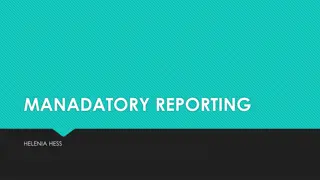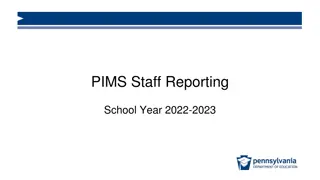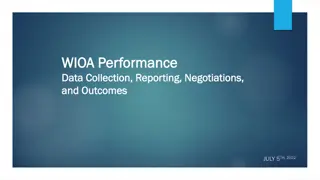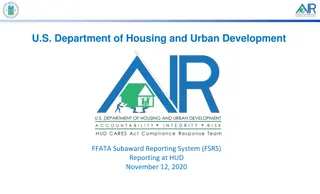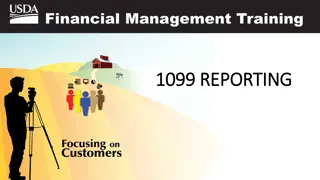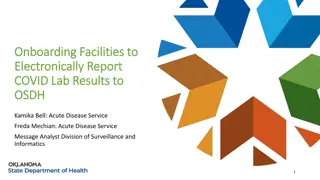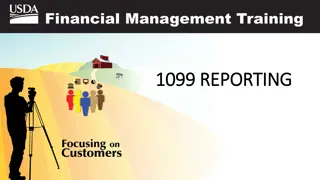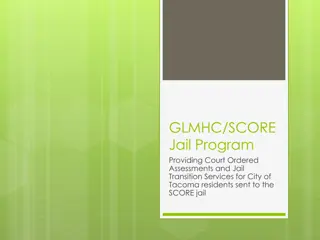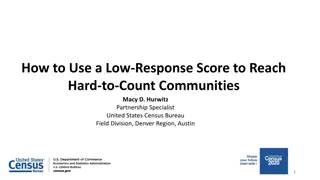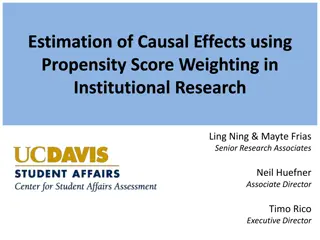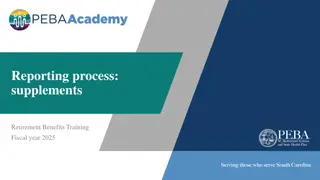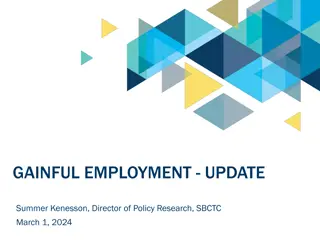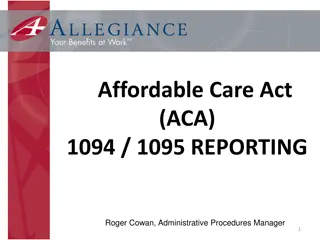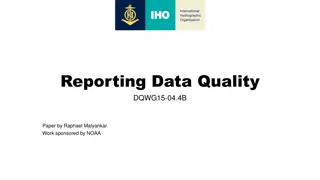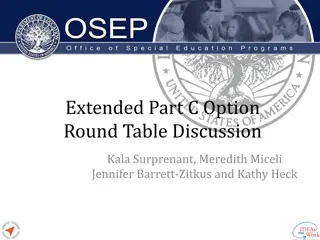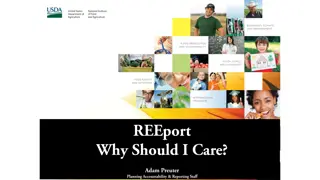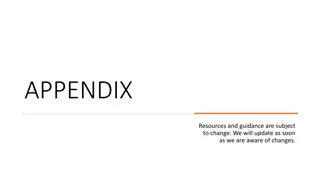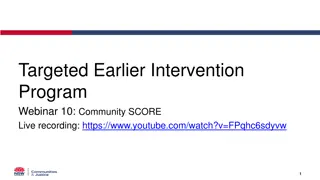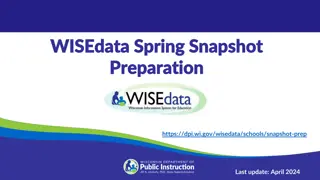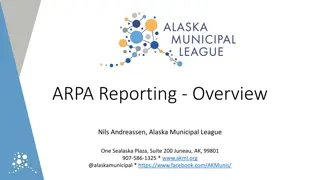ECC Social Value Reporting and Evaluation Framework
Essex County Council (ECC) has implemented a robust Social Value Reporting and Evaluation framework based on the Local Government Association's National TOMs method. This framework categorizes and assesses social value contributions in two parts - Value Score and Supporting Statement Score - to deri
3 views • 16 slides
Importance of Integrating Sustainability Reporting in Government Accounting
Sustainability reporting in government accounting in Africa promotes transparency, supports Sustainable Development Goals, attracts investments, manages resources, enhances efficiency, and fosters partnerships. The role of government accounting is crucial for transparent and sustainable governance t
3 views • 9 slides
Overview of Fall 2019 Reporting Information Session
High-level overview of TRS reporting for Fall 2019 including legislative changes, summary of rate changes for fiscal years, tips on starting a new year, and additional reporting tips. The presentation emphasizes the importance of accurate reporting and compliance with TRS Laws and Rules. Ensure time
1 views • 29 slides
Mandatory Reporting Guidelines for Suspected Child Abuse/Neglect
Understanding mandatory reporting requirements for child abuse and neglect is crucial for various professionals and individuals working with children. This content emphasizes the legal obligations and procedures involved in reporting suspected cases, ensuring immunity for those reporting in good fai
1 views • 6 slides
Comprehensive Overview of PIMS Staff Reporting for School Year 2022-2023
Offering insights into PIMS Staff Reporting agenda, reasons for data reporting, roles of EL Coordinators, and details on Professional Staff reporting criteria and templates. The content covers federal reporting requirements, Equitable Access data, and trends in education personnel.
1 views • 39 slides
WIOA Performance Data Collection and Reporting Overview
Requirements for reporting under the WIOA program, including data collection, negotiations, and outcomes reporting. Details on the reporting periods, reporting entities, core programs, partners, and the individuals included in the Participant Individual Record Layout (PIRL) reports.
6 views • 25 slides
Understanding FFATA Subaward Reporting System (FSRS) at HUD
FFATA requires federal award information to be publicly available on a searchable website. FSRS is a reporting tool for prime awardees to report sub-recipient/contractor awards and executive compensation data. This article delves into FFATA requirements, FSRS roles, responsibilities, and reporting p
2 views • 15 slides
Understanding 1099 Reporting Guidelines and Systems
The article provides insights into the 1099 reporting process, including details about the Miscellaneous Income System (MINC), Form 1099 issuance, criteria for 1099 reporting, the Statement of Earnings System (EARN), and the Special Payroll Processing system (SPPS). It explains the responsibilities
2 views • 15 slides
Streamlining Electronic Reporting of COVID Lab Results to OSDH
This documentation outlines the process of electronically reporting COVID lab results to the Oklahoma State Department of Health (OSDH). It covers the purpose, available options, specifications, formats, and the onboarding and testing process, aiming to accelerate the reporting of healthcare facilit
0 views • 9 slides
Overview of 1099 Reporting Systems
The 1099 Reporting Systems consist of MINC, EARN, and SPPS, which are used for IRS 1099 reporting purposes. These systems handle transactions and generate Form 1099 for recipients based on predefined criteria. Taxpayers are responsible for accurate reporting to the IRS, with reporting thresholds set
0 views • 15 slides
Top 5 Ways to Improve Your CIBIL Score
In addition to determining whether you will be able to get a loan, your CIBIL score will determine how much interest you will pay. Your money depends on you taking care of it . If your score is high, some lenders may be more likely to lend you money.
11 views • 3 slides
Effective Score Marking Process for Music Study
Explore the comprehensive process of score marking for music study, covering essential components like musical, technical, historical needs, and the values associated with good literature. Learn about composer composition, graph analysis, and the importance of efficient score marking to enhance your
0 views • 13 slides
Hemp Acreage Reporting & Certification Q&A with USDA
Explore essential information about Hemp Acreage Reporting, Certification, and compliance procedures in this Q&A session with the Farm Service Agency (USDA). Learn about important deadlines, required documentation, and the significance of reporting accuracy for various programs. Discover how to file
0 views • 15 slides
UNEP Support for Improving UNCCD Reporting Procedures
UNEP has been providing support since 2010 to enhance the reporting processes of the UNCCD, focusing on streamlined funding approaches, technical assistance, and capacity building. Key outcomes include the development of reporting tools, online reporting systems, and building credible data from coun
0 views • 14 slides
Climate Change Monitoring, Reporting, and Verification (MRV) Training Session Overview
This document outlines the purpose and reporting requirements for the development of a Climate Change Monitoring, Reporting, and Verification (MRV) system, focusing on projections and scenarios. It highlights the importance of collecting information for climate mitigation, assisting Serbia in meetin
0 views • 19 slides
GLMHC/SCORE Jail Program: Providing Services for City of Tacoma Residents
GLMHC/SCORE Jail Program offers court-ordered assessments and transition services for City of Tacoma residents sent to the SCORE jail. Learn about its background, the purpose of SCORE, mental health services provided, and the collaboration efforts to address gaps in service provision.
0 views • 21 slides
Transitioning to Incident-Based Crime Reporting: Enhancing Transparency and Accountability
Anytown Police Department (APD) is leading the transition from Summary Reporting to Incident-Based Reporting through the National Incident-Based Reporting System (NIBRS). This change promotes transparency, provides detailed crime data to the public, and improves statewide and national crime statisti
3 views • 17 slides
Insights into Structured Reporting Practices in Colorectal Cancer Imaging
A survey conducted by Dr. Eric Loveday at North Bristol NHS Trust revealed the current landscape of structured reporting in MRI and CT scans for rectal and colon cancer. Results indicate a positive outlook towards implementing national standards for structured radiology reporting, with an emphasis o
0 views • 7 slides
Strategies for Reaching Hard-to-Count Communities Using Low-Response Score
Explore how to leverage a low-response score to engage with hard-to-count communities effectively. Learn about ROAM mapping tool, the 2020 Census goal, and the significance of Low Response Score (LRS) in identifying areas for targeted outreach. Discover hard-to-count variables and how to utilize dat
0 views • 14 slides
Estimation of Causal Effects using Propensity Score Weighting
Understanding causal effects through methods like propensity score weighting is crucial in institutional research. This approach helps in estimating the impact of various interventions, such as a writing program, by distinguishing causation from correlation. The use of propensity score matching aids
0 views • 22 slides
Employee Benefits Reporting and Training Procedures for Fiscal Year 2025
The reporting process for retirement benefits in fiscal year 2025 includes supplements, employer reporting representatives, supplemental contribution reporting, service reports, furlough supplements, and a disclaimer. Employers can find detailed instructions on submitting various forms through the E
0 views • 6 slides
Streamlining Gainful Employment Reporting Process for Title IV Programs
Gainful Employment reporting requirements for Title IV programs involve historical uploads, student data submissions, and a detailed workplan by SBCTC to assist colleges in meeting compliance. The reporting burden includes annual updates and student-level data reporting. SBCTC's workplan aims to red
0 views • 16 slides
Affordable Care Act (ACA) 1094/1095 Reporting Guidelines
Affordable Care Act (ACA) requires employers to report information to the IRS regarding individual and employer responsibilities under the ACA. The reporting includes details on individual responsibility, employer responsibility, exemptions, and reporting requirements for different types of employer
0 views • 52 slides
Data Quality Reporting in Distribution Chain
Data Quality Reporting in the distribution chain is crucial for evaluating and ensuring the quality of exchanged data sets. This paper by Raphael Malyankar sponsored by NOAA discusses the importance of reporting data quality results, the stages in the production/distribution chain where reporting is
0 views • 15 slides
Understanding SAT Math Score Percentiles
Learn how to determine your score percentile on the math section of the SAT by using a normal distribution curve to find where your score falls relative to other students. Discover the concept of percentiles and how they reflect your position in relation to the mean and standard deviations of the sc
0 views • 39 slides
Understanding Reporting Requirements in Part C Exiting Data Collection
Explore the guidelines for reporting in the Part C Exiting Data Collection process, including who should be reported, how children in the Extended Part C Option are documented, and the eligibility criteria for different reporting categories. Learn about reporting by race/ethnicity, gender, and reaso
0 views • 11 slides
Why Care About REEport: Project Initiation, Annual Reporting, Financial Reporting
Understanding the importance of REEport is crucial for project directors as it involves project initiation, annual reporting, and financial reporting. These reports are essential for demonstrating the value of federal funds, planning purposes, and generating support for projects. Assistance and reso
0 views • 25 slides
Reporting Obligations Under the Montreal Protocol and Multilateral Fund
This informative content focuses on the reporting obligations under the Montreal Protocol and Multilateral Fund, highlighting data reporting under Article 7, submission requirements, differences between Article 7 and Country Programme reporting, and details on when and how to submit data. It also di
0 views • 19 slides
Simpler Systems Reporting Pilot for Financial Data Enhancement
The Simpler Systems Reporting Pilot is underway to enhance financial data reporting at the university campus. Led by Vice President Ryan Nesbit's team, this initiative aims to improve University-wide financial reporting mechanisms and accessibility to data through the Simpler tool. The pilot include
0 views • 5 slides
LTC Reporting Requirements and COVID-19 Testing Resources in Illinois
LTC reporting requirements include point-of-care test results and vaccination reporting for CMS-certified skilled nursing facilities. The NHSN COVID-19 reporting pathway details resident impact, facility capacity, staff and personnel information, supplies and PPE availability, therapeutics administe
0 views • 5 slides
Heart Score for Improved Risk Stratification in Patients with Chest Pain
Heart Score is a valuable tool for stratifying patients with chest pain in the emergency setting, aiding in clinical decision-making. This algorithm helps differentiate causes of thoracic pain effectively, minimizing false negatives and reducing unnecessary hospital admissions. By assessing factors
0 views • 30 slides
Community SCORE - Outcomes Reporting Webinar
Explore the Community SCORE outcomes reporting tool in this insightful webinar. Learn how to effectively utilize Community SCORE for reporting client outcomes and satisfaction, benefiting individuals, groups, and communities. Discover the importance of measuring client outcomes and how it can enhanc
0 views • 30 slides
Overview of WISEdata Snapshot Preparation and Reporting Requirements
The WISEdata Snapshot Preparation provides crucial details on data entry, validation, and reporting processes for educational institutions. It outlines the importance of accurate data collection for federal reporting, public reporting, and funding determinations. Additionally, the Snapshot Reporting
0 views • 41 slides
Ensuring Chemical Reporting and Preparedness at the DEQ
The Chemical Reporting and Preparedness section at the DEQ focuses on regulations under EPCRA, prompted by incidents like the Bhopal tragedy. EPCRA covers Tier II reporting, spill reporting, LEPCs, State Emergency Response Commission, and Oklahoma Hazardous Materials Emergency Response Commission. T
0 views • 17 slides
ARPA Reporting Overview and SLFRF Guidelines in Alaska
This document outlines the reporting overview for the ARPA (American Rescue Plan Act) and specific guidelines for the Coronavirus State and Local Fiscal Recovery Fund (SLFRF) in Alaska. It covers acceptance, use, and reporting of funds, as well as designating staff roles for managing reports. The co
2 views • 22 slides
Understanding the HEART Score for Risk Stratification in Patients with Chest Pain
The HEART score is a valuable tool for stratifying patients presenting with chest pain in the emergency department. It helps in distinguishing between low, intermediate, and high-risk individuals and guides further management decisions. By incorporating factors like history, ECG findings, age, risk
0 views • 30 slides
Feedback Analysis on Medication Incident Reporting in Hospitals
Feedback received from IMSN members on NIMS and incident reporting revealed various issues affecting the rates at which staff report medication incidents/near misses within hospitals. Major themes included staffing numbers and turnover, pharmacist involvement in incident reporting, clinical pharmacy
0 views • 12 slides
Importance of Wildland Fire Reporting to the Fire Community
Wildland fire reporting plays a critical role in providing accurate data for effective fire management. Defined state fires and challenges in reporting impact funding, risk management, and agency support. Comprehensive reporting like the Wildland Fire Occurrence Reporting for Massachusetts is essent
0 views • 6 slides
Understanding SDSU's Writing Placement Assessment (WPA)
SDSU's GWAR, an argument-based Writing Placement Assessment, requires students to write an essay analyzing a given argument. Scores range from 2-10, with different score bands dictating course requirements. Achieving a perfect score is subjective, emphasizing clear and concise argument analysis. Som
0 views • 35 slides
Advanced Applications of Monte Carlo Wind Probability Model in Hurricane Analysis
Update on the Year 1 Joint Hurricane Testbed Project, focusing on the Monte Carlo Wind Probability Model and its estimation of wind probabilities for different intensities. The model incorporates track and intensity error distributions, land proximity, and serial correlations to provide accurate for
0 views • 23 slides



